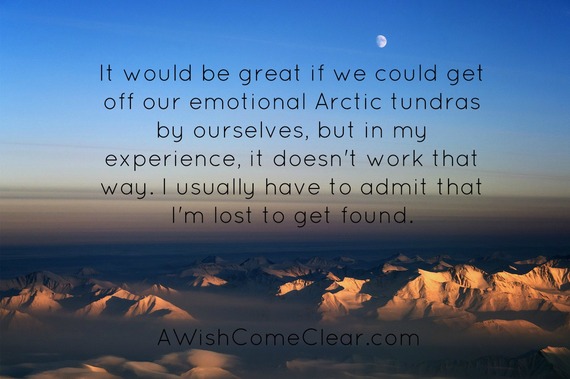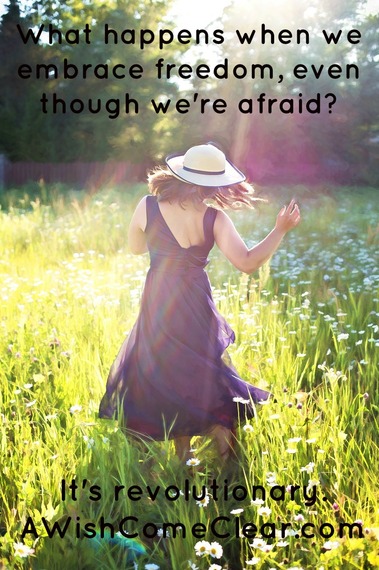Have you ever struggled with a weighty sense of failure, a belief that no matter what you try, you'll make the wrong move?
Have you ever found yourself feeling uncomfortable in a group, thinking: I don't belong with all these happy people. I'd like to cheer up, but I'm tense and miserable. Wish I could be like them ... ?
If so, you are not alone.
So many of us are walking around with a judge and jury in our heads. We don't believe that we're enough as we are. Instead, we're putting ourselves on trial, and the "verdicts" leave us feeling unworthy and isolated.
Once upon a time, I struggled with a pervasive sense of disconnection at church. Every few Sundays, the feeling would descend. I'd sit there wishing that I could go home, or that I hadn't come at all.
There in church, surrounded by friends, I found myself on an emotional Arctic tundra: frozen, lonely, and potentially lethal.
Needless to say, this was troubling. I like the small church I attend. The people radiate love and acceptance. So why the sense of doomed separation?
One Sunday, I came home and said to my husband, "I can't do this anymore." I didn't want to give up on church, but I didn't want to keep feeling horrible either.
So I did what we perfectionists do as a last resort: I asked for help.
It would be great if we could get off our emotional Arctic tundras by ourselves, but in my experience, it doesn't work that way. I usually have to admit that I'm lost to get found.
Reluctantly, I described the problem to my counselor. She asked helpful questions, and a picture began to emerge.
It was a picture of a young woman who was taught to sing without moving, to keep her hands by her sides. Someone who wanted freedom, even as she believed that it could never belong to her.
My counselor asked, "In church, do you feel like you have permission to do what feels right for you? That you can choose to clap or not clap, to stay or to leave, if that's what you need?"
"No," I said, the light dawning. "I don't feel like I have permission to do any of that. If everyone is clapping and dancing, then it seems wrong for me not to join. But I feel guilty about joining if it doesn't feel authentic. I end up thinking that I'm the problem."
"So you feel that you have to do what everyone else does, and there's something wrong with you if you don't?" she asked.
"Yes!" I said. "And I feel self-conscious because I don't know what I'm 'supposed to' do. The assignment is, 'Go with the flow,' and I'm thinking, 'What are the rules? Can I get a checklist?'"
"Do you think that this may have to do with past experiences?" she asked.
"Yes. When I was young, I learned to act grown-up and self-contained in church, the same as others."
Growing up, I attended The Worldwide Church of God (WCG). The WCG was a cult, characterized by exclusivity, secrecy, and an authoritarian culture. There was lots of emphasis on conformity, and very little room for individuality.
"So now ... I'm trying to be authentic and the same as," I said. "And I just end up feeling lost."
Until that day, I didn't realize how much of my identity was wrapped up in spiritual achievement.
As a girl, I'd filled out every Bible lesson book. I was the first of my friends to be baptized. I never missed devotionals, and I served in various leadership roles.
In other words, "Hi, my name is Caroline, and I'm a religious performance addict."
So when I came to a place that encouraged me to let all that go and just be myself -- the place I'd secretly longed for -- I didn't know how to handle it.
"Growth is not a strictly linear process," my counselor said, gently. "Just because you don't want to clap on a given day doesn't mean that you're failing spiritually."
But where does that leave us, we who measure our spiritual self-worth by our accomplishments? What do we do when we're stuck on that emotional Arctic tundra?
The first thing to do is to bring our hidden rules to light. If we don't recognize or acknowledge them, we can't see how they're impacting us. Then, once we see our internal rules for what they are, we can ask ourselves: is this how I want to live?
I know -- it's scary to see that we have choices. When we realize that we can turn the keys, it brings up all kinds of fears and anxieties.
But what happens when we embrace freedom, even though we're afraid? It's revolutionary.
I believe that you can do this, even though it's hard. To start, meet with a trusted, compassionate friend and stop pretending to have it all together. Risk real connection as though your psychological survival depends on it... because it does.
In The Joy Diet, Martha Beck quotes psychologist Judith Hermann:
"... while the unit of human physical survival is one, the unit of psychological survival is two. Without someone to connect with, we quite simply can't go on. Not any of us."
Tell your friend about the times that you have felt frozen and alone in church. Let yourself receive kindness and support. Chances are, you'll feel yourself beginning to thaw.
After all, that's what happens when you step out of the cold and into the warmth of waiting arms.
***
This piece first appeared on A Wish Come Clear, a blog devoted to helping you choose love, lose fear, and find home. Visit and receive free copies of Caroline's three digital books, all designed to bring you back to what matters most.


